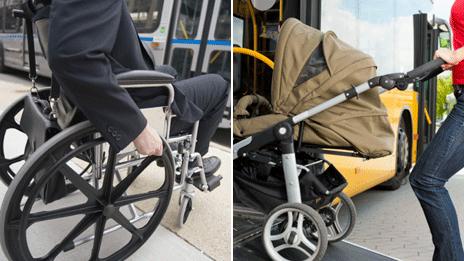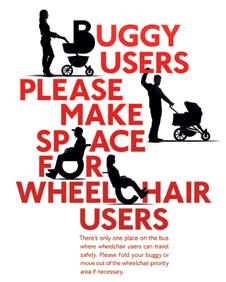Wheelchair users' fight for bus space
- Published

Although all new buses must be wheelchair accessible, many disabled passengers have problems accessing the priority space
Bus companies may have made it easier for disabled people to get on to their vehicles - but are wheelchair users failing to get on board because parents with pushchairs are commandeering their spaces?
"There's this constant stress when I go for a bus as to whether there's going to be a space or not," says Doug Paulley who has used a wheelchair for 12 years.
"I'm scanning the queue for people with pushchairs or when the bus is pulling in I'm looking at the wheelchair space. There exists this permanent threat I won't be able to get on."
And Mr Paulley's story is a common one.
Although by law buses must have a space for wheelchair users, being able to access it is one of the main problems disabled passengers say they face.
Landmark court case
In February 2012, Mr Paulley, from Wetherby, West Yorkshire, was prevented from travelling on a First bus to Leeds because the driver refused to insist that a mother with a pushchair should leave the space because it would wake up her baby.
It was "the straw that broke the camel's back" and spurred him to take legal action against one of the country's biggest bus companies, resulting in a landmark victory.
"That day in February resulted in me not using a bus again for a year," said Mr Paulley, who suffers from a neurological condition.
"I lost all confidence and couldn't face it anymore.
"I ended up late for a family day out. It was an embarrassing and stressful journey and I'd just had enough."
Mr Paulley lives in a care home with 17 other disabled people and said many of the people there had also suffered from the same problem.
"We tend to have enough going on just by being disabled and thinking about whether we'll able to get on the bus or not is an extra barrier," he added.
Following a legal battle lasting 18 months, a judge ruled in September the incident was unlawful discrimination in breach of the Equality Act 2010, external, which applies to all transport providers. First Bus was ordered to change its policy.
But if the law requires buses to provide wheelchair space, then why did Mr Paulley end up in court?
According to his lawyer Chris Fry, without any previous case law or precedent, it was left to individual bus companies to interpret how far they would go to make sure the legal obligation was met.

A judge at Leeds County Court awarded Doug Paulley £5,500 in compensation
"Some bus companies have decided not to take ownership of the problem and have left it to passengers to resolve between themselves," he added.
"Someone in a wheelchair may have had a lot to deal with during their day and the last thing they want to do is get on a bus and fight for their opportunity to travel.
"I think bus companies have got away with what they know to be a vulnerable area and that's enabled them to duck the issue."
And months earlier, a similar attempt by a group of disabled passengers in Darlington failed, meaning a successful result for Mr Paulley and his legal team was questionable.
The bus driver in Mr Paulley's case said he had refused to intervene because the company said its "first come, first served" policy did not allow him to force the mother to give up the space.
It was challenged by the judge who said refusing to give up a space for someone with a wheelchair was akin to ignoring a ban on smoking on buses - or carrying out anti-social behaviour on public transport.
His judgement added: "Although such a policy might inconvenience a mother with a buggy, that I am afraid, is a consequence of the protection which Parliament has chosen to give to disabled wheelchair users and not to non-disabled mothers with buggies."
The problem is all too familiar for Carole Broadbent, whose grandson David has muscular dystrophy and uses a wheelchair.
"David has had this problem getting on buses since he was nine years old and he's now 24," said Mrs Broadbent, from Hull.
"It regularly happens that a mum and pushchair are in the wheelchair space and the driver tells David he can't get on the bus because there's no space."
Back in Mr Paulley's case, Mr Fry said that ensuring disabled passengers were given a space should not amount to a battle between wheelchair and pushchair users.
'Not troublemakers'
A lengthy discussion thread on Mumsnet, external, an online forum for mothers, was used in evidence in the case.

Transport for London posters aim to clarify any confusion
A parent had posed the question asking if they were being unreasonable to think pushchairs had the same priority on buses as wheelchairs.
The overwhelming response was in favour of wheelchair users.
Mumsnet founder Justine Roberts said it was "great" to get space for a pushchair on a bus but the website's users were clear that wheelchairs had to take priority.
"What Mumsnet users would like to see is improved space for pushchair storage but certainly not at the expense of space for wheelchair users," she added.
Mr Fry agreed mothers were "not troublemakers" and that drivers were also "not to blame".
"It is the bus operators' responsibility to provide clear instructions and training to staff about the correct use of the space so they are well-briefed to act when there is any confusion or dispute," he said.
For now, Mr Paulley's case has set a legal precedent meaning there is a blueprint for other disabled passengers to follow if they encounter similar difficulties. A judge at Leeds County Court also awarded him £5,500 in compensation.
But the victory may be short lived if First's application for leave to appeal the decision is granted.
In a statement, the company said: "We recognise how important it is that bus services are accessible to all customers and our drivers across the country are trained to act in accordance with our policy, which is to ask in the strongest polite terms to make way for the wheelchair user, which the driver did in [Mr Paulley's] case.
"A previous court decision on very similar facts decided that this approach was correct. There is therefore real uncertainty as to our obligations and we have decided to ask for permission to appeal as we believe it raises important issues for the wider industry."
- Published23 September 2013